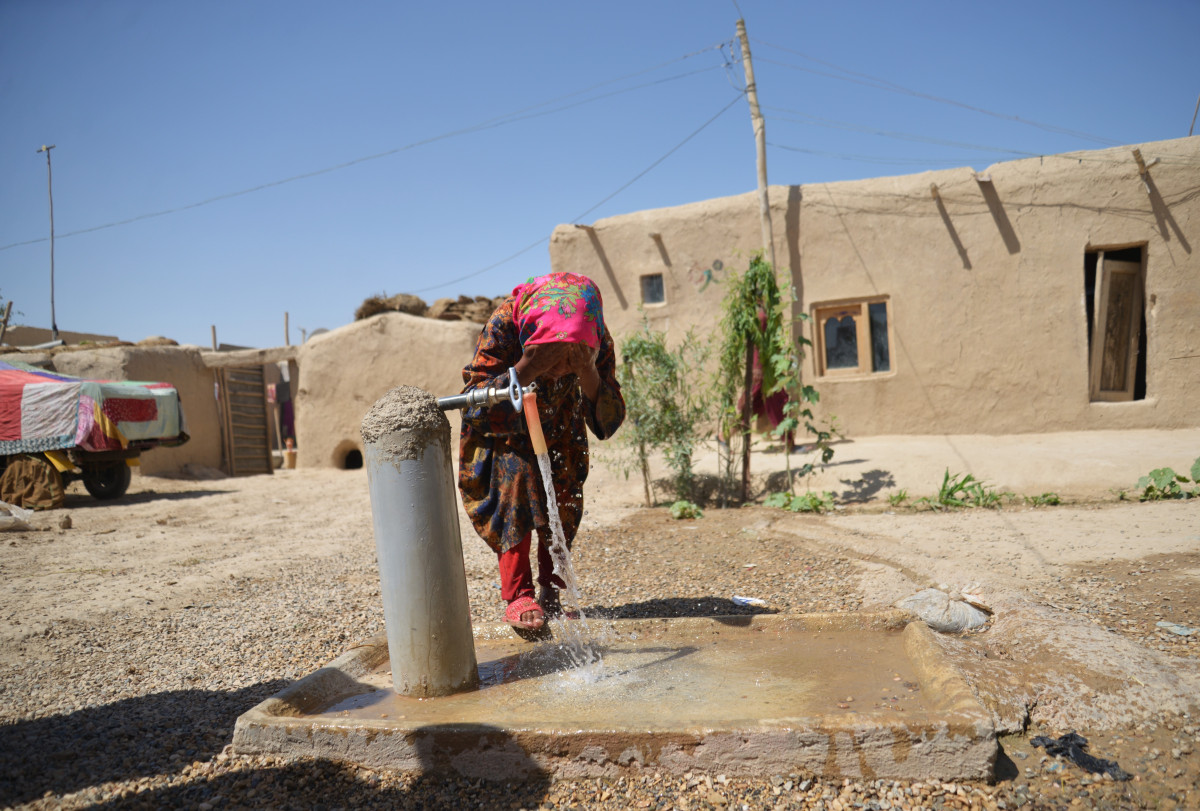"Without water, we are nothing"
Published: Oct 23, 2017 Reading time: 4 minutes Share: Share an articleSolar Powered Water Supply System Improve Life of Afghan Marginalized Communities
Access to water is a basic human necessity, fundamental for a dignified and healthy life. Significant improvement in access to water and sanitation is one of the biggest achievements of the post-Taliban era reconstruction efforts in Afghanistan. Yet, according to the United Nations, 39% of the total population still needs access to improved water supply. Ensuring access to water and sanitation for all is one of the Sustainable Development Goals the world leaders pledged to achieve over the next 15 years. People in Need, with the funding of the Consulate General of the Federal Republic of Germany, made this a reality for 140 households of the Jogi community living in Mazar-e-Sharif.

Jogis, one of the many ethnic groups living in Afghanistan were historically nomads, but changing socio-economic patterns led to a decrease in their nomadic lifestyle; these days Jogis are more likely to settle in specific areas of the country for more prolonged periods of time. Like many communities in Afghanistan, Jogis are often internally displaced due to conflict or natural disaster but as one of the most marginalised groups in Afghanistan, vulnerability is compounded by a lack of their legal recognition by the state. This translates, among many other issues, to limited access to electricity and safe water in their current settlements, often reminding more a makeshift refugee camps, than a long-term housing arrangement.
Water 30 minutes away and often only at night
Previous People in Need (PIN) and German Consulate interventions, aimed at improving food security and nutrition and hygiene practices, have led to an improvement of the situation in the Mazar-e-Sharif Jogi community; however, access to water continued to be a challenge. More than a third of households had to walk more than 30 minutes to fetch water. Baasha Timur, the community leader recalls: “It’s been many years since we settled here, but we were never supported with this type of project, which would bring drinking water to our homes. We used to fetch water from other people’s sources, asking for permission and paying them for it. We often had to go during the night when they did not use it, so it was with lots of difficulties”. As he speaks, other people from the community are joining the conversation. Discussion turns to health issues, and how difficult it was to even to ensure basic hygiene, when the water was so scarce. “You know, without water, we are nothing”, concludes one of the men who joined the conversation.
Now, in the centre of the community, there is brand new water system, able to supply at least 25,000 liters of water per day to the 140 households who live here, from the 70 meters deep well powered by 14 solar panels. Even people from surrounding non-Jogi areas sometimes come and fetch the water for themselves. “This project didn’t only give us access to water but also made our relationship very good with our neighbors, as now they are also using this water and everyone is very content”, Baasha Timur adds. The 800 meters pipe system supplies water to 16 taps, strategically located across the community to ensure fair distribution among all the families who live there. PIN provided a technical maintenance training as well as necessary tools, so the beneficiaries can continue to take care of the new water system themselves. The community established a water management committee, whose members, selected from different households, are in charge of the maintenance of the solar panels and regular control of the technical aspects of the water system. The construction, overseen by PIN engineers, was a collaborative effort where community members also contributed through the provision of labor, promoting local ownership of the project.
Women are the ones benefitting the most
Once the construction of the water system was finished, PIN conducted a hygiene promotion session with 100 participants – one member from each household. The session focused on the importance of consuming clean water, the ways of safely collecting and storing water and available water treatment techniques, as well as refresher training on healthy nutrition and hygiene practices, already delivered by PIN in the past.
Now there is enough water to comfortably cover all the daily needs of the people living in the settlement. For the local women, the positive change was particularly significant, as they are the ones traditionally taking care of the children and majority of the domestic chores. One of them, Lana Afzali, is 57 and has only a daughter and a small grandson. Both she and her daughter are widows. She proudly points to the new water tap, located right in front of her modest house and says: “As I don’t have a son and I lost my husband, I couldn’t fetch water by myself during those late nights from other communities’ sources. I had to pay someone to get water for us and these costs were very high for our family. Now I don’t need to do this anymore, as I have the tap right here.” Baasha Timur adds: “Before, our people were often fed up with this kind of life. Now they can think of themselves as human beings, this project gave us so much value.”
This project was implemented by People in Need with funding from the Consulate General
of the Federal Republic of Germany in Mazar-e-Sharif.
Lateef Waziri, PIN Afghanistan Communication Officer
Ubaidah Haajay, PIN Afghanistan NRM/Livelihood Project Manager
*Names of people have been changed in the article for security reasons








